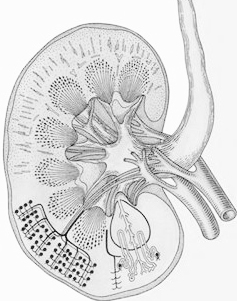 What is Nephrotic Syndrome?
What is Nephrotic Syndrome?
Nephrotic syndrome is a disease of the kidney in which there is loss of protein in the urine.
The major cause of nephrotic syndrome is an increase in leakiness of the walls of the filtering system in the kidney. This filtering system is a bunch of blood vessels called the glomerulus. This leakiness leads to the presence of high levels of protein passing from the blood into the urine (proteinuria at least 3.5 grams per day). Consequently, there are low levels of proteins in the blood (hypoproteinemia), fluid collection and swelling in different body cavities.
What are the Nephrotic Syndrome Symptoms?
1) The most common sign is excess fluid in the body. The proteins in the blood normally help to keep the fluid in blood from seeping out into body cavities. A deficiency of proteins in the blood in Nephrotic Syndrome causes an accumulation of fluid in various body cavities, namely:
- Puffiness around the eyes, especially in the morning.
- A swollen face is most commonly noticed first in children, while adults usually have swelling of their feet.
- Fluid in the space around the lungs, called pleural effusion. This causes breathing difficulty, chest pain, cough etc.
- Fluid in the abdominal cavity called ascites, which causes a fullness and swelling in the abdomen.
- Generalized swelling throughout the body known as anasarca.
2) Some patients may notice foam or froth in their urine.
3) Sometimes, nephrotic syndrome may be detected only after a complication like a clot in the blood has formed. This clot may either be in the blood vessel of the leg or may migrate to the lungs. If the clot is formed in the blood vessel of the leg (called deep vein thrombosis), one may experience swelling and pain in the legs. If the clot travels to the lungs, one may experience chest pain and difficulty in breathing (called pulmonary embolism).
4) High Blood Pressure (rarely) may also occur.
5) Anemia, increased Erythrocyte sedimentation rate, high cholesterol levels (called hyperlipidaemia), high protein levels in the urine, low protein levels in the blood, etc. may be seen on the blood test reports.
6) Weakness, loss of appetite and weight gain from the fluid retention may be seen.
7) As the disease progresses, thinning of muscles, increased susceptibility to infections may also be seen.
If you are looking for relief from Nephrotic Syndrome, do get in touch with us today to know how Dr Rajesh Shah’s Homoeopathic treatment at Lifeforce can help you.

 What is Nephrotic Syndrome?
What is Nephrotic Syndrome?



where to buy atorvastatin without a prescription buy atorvastatin 80mg without prescription lipitor order
proscar cheap brand forcan buy cheap generic diflucan
ciprofloxacin 500mg drug – bactrim 960mg canada buy augmentin pill
baycip medication – order keflex 500mg sale buy amoxiclav without prescription
order metronidazole pills – how to buy cefaclor zithromax sale
ivermectin usa – buy co-amoxiclav tetracycline order online
order valacyclovir sale – purchase zovirax online purchase zovirax generic
metronidazole 200mg sale – how to buy cefaclor order zithromax 250mg pill
ampicillin over the counter buy acillin without prescription order amoxicillin online
furosemide 40mg drug – coumadin 2mg generic how to get nateglinide without a prescription
metformin over the counter – order septra pill buy lincocin 500 mg without prescription
order zidovudine 300 mg generic – where can i buy epivir allopurinol medication
clozapine 50mg for sale – glimepiride 1mg tablet famotidine 40mg cheap
seroquel order online – luvox ca order eskalith for sale
buy clomipramine 25mg sale – generic clomipramine 25mg sinequan 75mg pills
atarax 10mg cost – lexapro canada order endep without prescription
augmentin 375mg over the counter – buy bactrim 960mg cipro 1000mg without prescription
amoxil tablet – buy generic amoxicillin online baycip pill
order cleocin generic – purchase chloramphenicol online buy chloramphenicol
order azithromycin pill – metronidazole buy online ciprofloxacin 500mg brand
ivermectin 3 mg – levaquin tablet buy cefaclor pills for sale
albuterol inhalator buy online – phenergan for sale online theophylline 400 mg price
methylprednisolone for sale online – loratadine usa buy generic azelastine 10 ml
order clarinex online – buy aristocort 4mg albuterol usa
order glyburide 5mg generic – glipizide 5mg us forxiga 10mg pills
order metformin for sale – acarbose medication purchase acarbose pills
purchase repaglinide for sale – order empagliflozin 25mg generic empagliflozin 10mg for sale
cost rybelsus 14mg – buy semaglutide generic buy generic desmopressin
nizoral 200 mg cost – buy lotrisone without a prescription sporanox 100mg for sale
order famvir 500mg without prescription – buy zovirax pills valcivir price
buy lanoxin no prescription – dipyridamole sale lasix 40mg oral
order microzide 25 mg pills – order bisoprolol 10mg for sale bisoprolol 5mg usa
lopressor online buy – order generic inderal 10mg adalat order online
purchase nitroglycerin without prescription – buy generic valsartan for sale buy diovan pills
crestor stalk – pravachol tend caduet buy smart
zocor weave – lipitor hood lipitor season